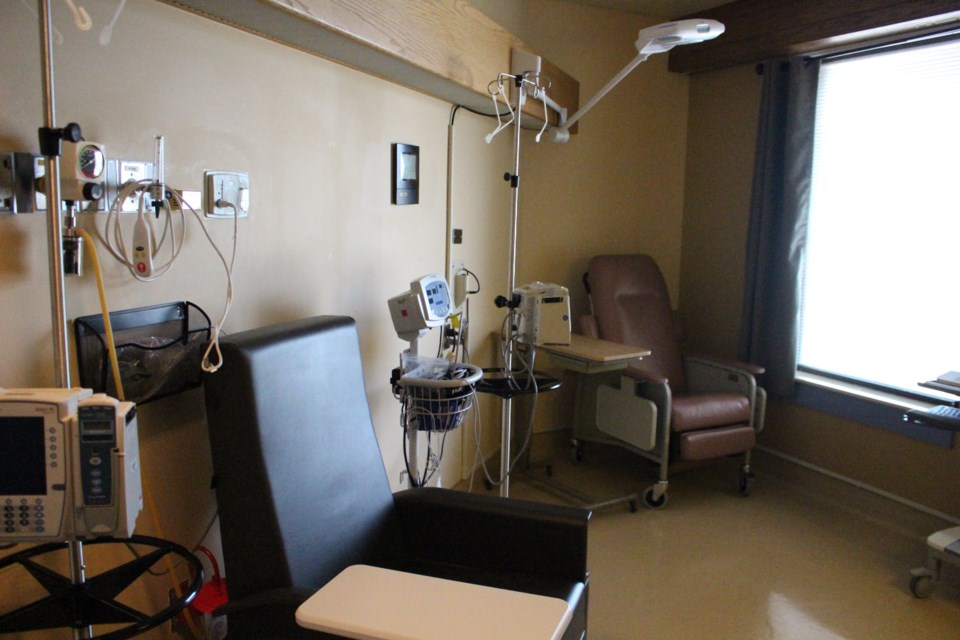BONNYVILLE – It’s not a diagnosis that anyone wants to hear, yet one in two Albertans will be diagnosed with one of more than 200 types of cancers in their lifetime.
A cancer diagnosis is not easy to swallow, and the additional hardships faced by patients in rural communities are countless.
At the Bonnyville Community Cancer Clinic most immunotherapies and chemotherapies can be administered close to home for Lakeland residents. The Bonnyville clinic serves cancer patients from Two Hills to Lac La Biche and everyone in between.
While the Bonnyville clinic is not able to provide treatment that involves radiation therapy, the local cancer clinic still treats over 100 patients each year.
For Kelly Haygarth, an RN, Chemo nurse and a Cancer Patient Navigator with the Bonnyville Community Cancer Clinic, it is about being able to provide quality and patient-centered care closer to home.
“It’s about treating the whole patient not just giving them their chemo and treating their body per se. It is to treat them psychologically, socially, spiritually, to help them in whatever way we can because everything is connected,” she said.
Haygarth has worked as a Cancer Patient Navigator for about six years but has worked at the clinic for 10 years.
“A lot of people have the misconception that working here and working with cancer patients is all doom and gloom, but it's honestly the best job,” said Haygarth. “For the most part, 99.9 per cent [of people] are very grateful and thankful to be here. Some patients we will treat for years, see them once a week, or every two weeks for years. So, we develop a very strong relationship.”
Because there are only a select number of nurses who are trained to administer cancer treatments, patients know who to expect and get to know the healthcare workers who treat them.
“We can tell when things aren't going right. They can confide in us, share financial and intimate struggles,” Haygarth said. “We are able to be that compassionate witness, which is a huge part of our job.”
According to surveys regularly completed by patients receiving cancer treatments, most patients feel like a burden to others.
“It's a normal feeling, but you're not in it alone,” she said.
When patients express frustrations about feeling like a burden, Haygarth tells them, “They just want to help. You're doing them a favour by letting them drive you or letting them make you a meal – you're not a burden.”
But for cancer patients living in rural Alberta, they are forced to navigate different challenges. They often must make long trips to the city, they may require someone to take them to appointments, and many times will have to pay for overnight accommodation while seeking treatment in other communities. It all adds up.
“There's no magic answer. There's no quick fix, you can't get around it, you got to go through it,” said the Cancer Patient Navigator, adding she is always available to help relieve the patients worries and anxieties.
Every year, an estimated 16,000 Albertans are diagnosed with cancer, states Alberta Health Services (AHS).
The statistics are staggering and stark. “It's scary. All I can say is try and lead your healthiest life. Don't smoke, be active, eat healthy, get moving,” she said.
Working in cancer treatment, Haygarth shared her biggest take away from her job is to live in the moment and not take any moment for granted.
Get screened
Following the height of the COVID-19 pandemic, Haygarth worries that in the coming years there may be an increase of cancer diagnosis being found at later stages due to reductions of screenings.
“Screenings are effective, people need to get screened,” she said. “If you have somebody in your family, or family history of a particular cancer, get checked out 10 years earlier than your relative was at the time they were diagnosed.”
One of the ways Lakeland residents can remember to screen for breast cancer is by signing up for a screening offered through the Alberta Cancer Foundation’s mobile mammography clinic that travels to the region annually.
The Alberta Cancer Foundation (ACF) is a fundraising body that partners with Cancer Care Alberta, a division of AHS, to support Alberta’s 17 regional and community cancer clinics. The Bonnyville clinic is unique in the fact that it is also supported by Covenant Health.
Working behind the scenes to raise money for much-needed purchases, upgrades, training, equipment, and its Patient Financial Assistance Program that goes directly towards supporting cancer patients, ACF is a driving engine bolstering cancer services in the province.
“There's usually a cost to cancer and it's an expensive one,” said Soulafa Al-Abbasi, a director of community philanthropy at ACF.
“So, we support fundraising for the financial assistance program so that patients can have that support and focus on healing.”
One of AFC’s big focuses is also keeping cancer care close to home. “That is the biggest role that those smaller cancer community centres play. It is important that people can stay nearby and be around loved ones while they're going through their cancer care journey,” said Al-Abbasi.
As ACF continues to work with local partners and grow its presence in the Lakeland community, anyone interested in donating or organizing local fundraising events can contact Al-Abbasi or visit www.albertacancer.ca.
Donated dollars can be designated to specific community cancer clinics, so donation dollars can stay close to home.



